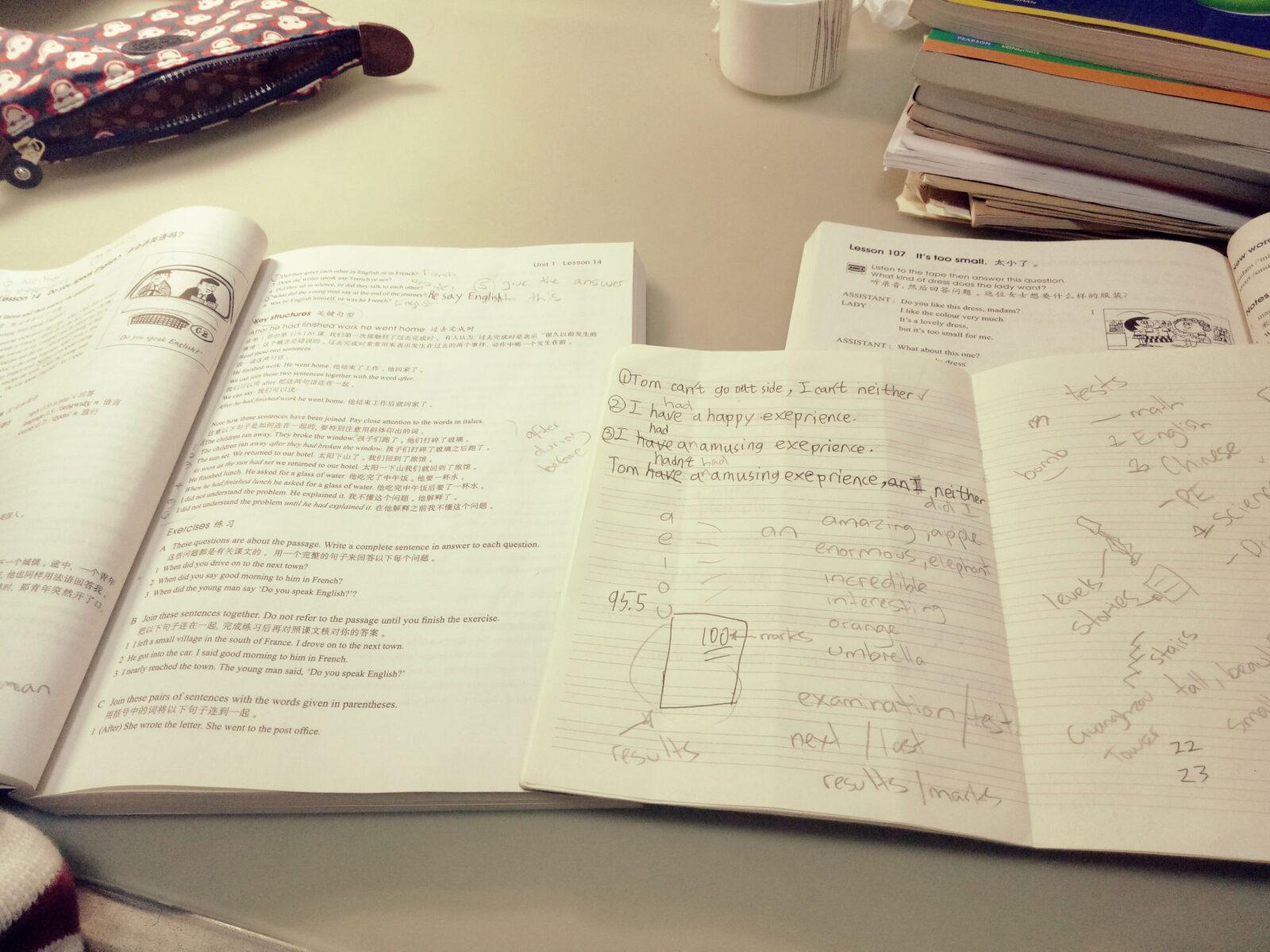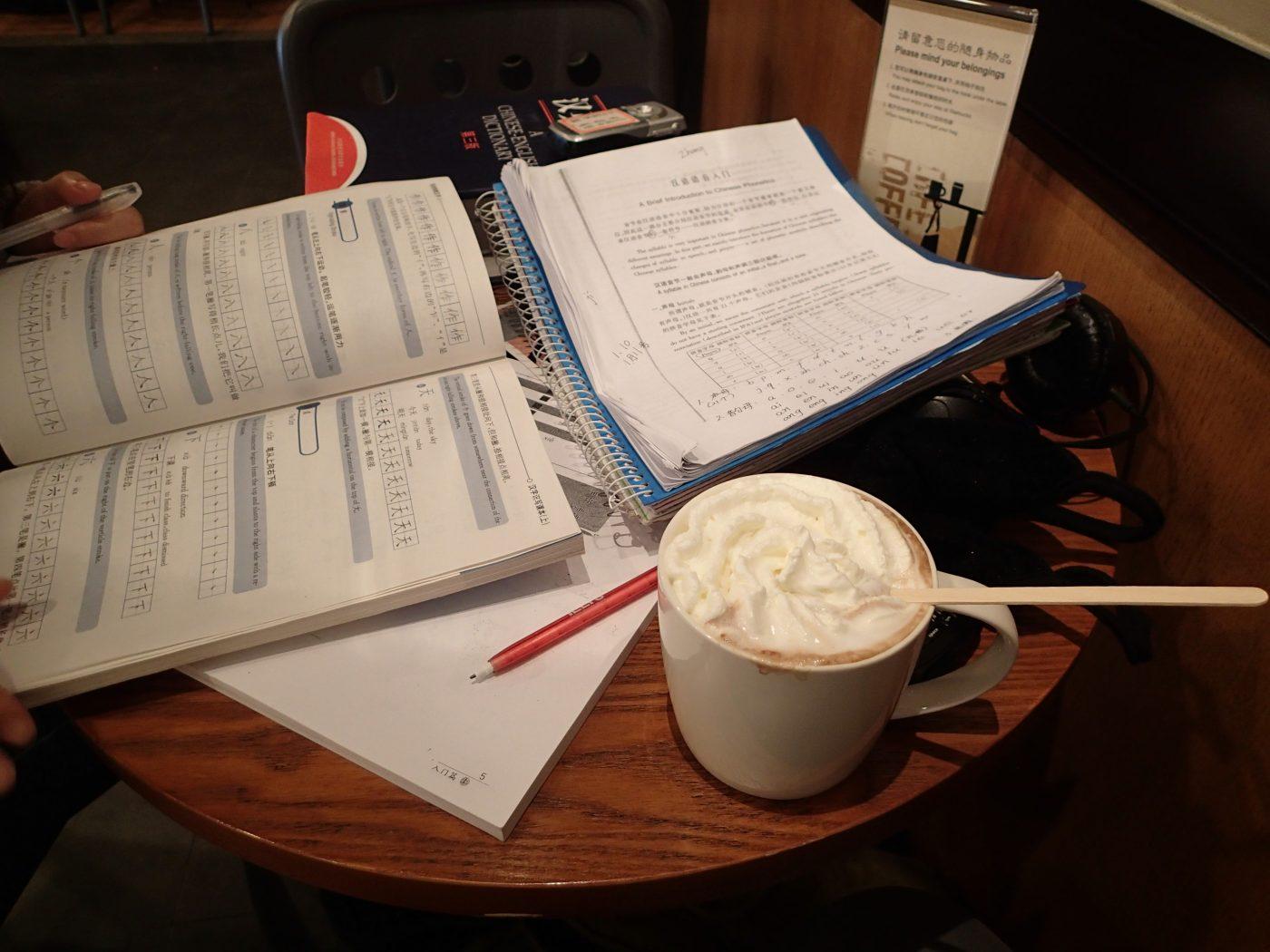Tutoring English in China (家教)
Class Start (上课)
I arrived to the boy’s parents apartment complex in Taojin (淘金) at 8:30 pm. The class with the boy soon started and lasted 1.5 hours.
My third class with this kid today was really easygoing.
He was sweating when we entered the study room. I asked him, “Why are you sweating?” His mom said, “He just went out to ride his skateboard. He just came back home.”
Homework Review (复习)
Then we sat down with the books, and went through his homework.
He wrote down three sentences with “before”, “after”, and “during”. He got two of the sentences right, and the third sentence wrong, so I corrected him on that.
Then we started to go through some exercises.
Exercise on Pronouns (练习)
The way that I started to teach him today was much more fluid, because we would talk about something in his homework, or talk about him, and when he made a grammatical mistake in his sentence, I would correct him.
For example, he would say, “Me” instead of “I” or “me” instead of “we”. I had to write down all of the pronouns on a piece of paper. I wrote, “I, me, we, her, she, they” and then I wrote down a simple sentence, which was, “I like mangoes.”
Then I asked him, “How do you say that? Is it likes or likes, or is mango a plural, mangoes.”
Exercise on Plurals and Singulars (练习)
I started to teach myself things that I did not know.
I had written all these words down, and I said, “Me like mangoes?” I paused for his response, and then continued, “No, you can’t say that. It is, ‘we like mangoes’. So, why is it ‘mangoes’ and not ‘mango’?”
“If there is just one of that thing and you cannot count it, then you have to say – mango. But because you know that the person likes the mango fruit, and he can eat a lot of it, and there is a lot available, then you can say – mangoes.”
“Because he is not just going to like to eat one, but he is going to like to eat many. So, the correct sentences is – I like mangoes.”
“But, if you are talking about Guangzhou, how many Guangzhou are there? One right? You can’t say I like Guangzhous. You have to say – I like Guangzhou.”
Exercise on Before and After – Reverse Order (练习)
At one point we talked about the things that we were doing before and after in our day.
I said, “Tell me about the things that you did during the day?”
He said, “I woke up. Then I went to school.”
I interrupted, “Before you went to school, you woke up, right?” I phrased it differently. So, every time he told me what he did after, I then asked him again, “What did you do before that?”
Teach New Vocabulary (词汇)
Then he asked me, “What did you do in your day?”
I replied, “Alright, let me do it in reverse order. Right now we are studying. Before we studied, I was having a coffee.” Then I stopped there because he asked me, “What did you have?” I said, “I can just show you.” I said, “Let’s name these things.”
I was basically teaching him new words from my picture. That is another prop that I used in class.
Exercise on Comparatives (练习)
Then there was a whole passage that we talked about regarding “a few”, “a bit”, “many”, “much”, “fewer”, “more”, “less”. They were all comparatives. We went through this from his homework. Then, we ended up talking about it in the class lessons.
When I engaged him in conversation about his day, what he did, and what he liked, he used sentences examples such as, “I like this more. I like this less”.
I said, “You mean these words here that we wrote down,” and went back to what we wrote.
There was a whole book exercise filled with diagrams about “fewer”, “more”, “most”, “less”.
I asked him, “Can you read the picture, what does that say?”
He answered, “I have more than him. I have fewer.”
I asked, “Which one is the comparative word (比较)?” I then underlined, “more”, “few”, “fewer”.
Comparatives – Mahjong Example (练习)
I did an example, saying, “Let’s pretend there are three people here. This teacup is one person, and then you are one person, and I am one person, and we are all playing Mahjong (麻将). Let’s put all the pens out and give each other some pens.”
I gave the cup three pens, gave him two pens, and gave myself one pen.
I then asked him, “Do you have more pens than the cup?”
He said, “Yes. I do.”
I asked, “Do you really?”
I asked him, “How many pens do I have?”
He said, “One.”
I asked, “How many pens does the cup have?”
He said, “Three.”
I asked, “Does the cup have more or less than me? More is 更多, and less is 更少.”
He said, “Oh. I understand. I have less than the cup.”
Exercise on Joining Sentences With “Before”, “After”, and “During” (练习)
It is really interesting that the words I had been randomly teaching him were also in the text book. I had been shifting between one book and the other. I had shifted between the basic book which had simple sentences.
I said, “You can use this book to join two sentences up.”
I began to use the simple book, saying, “This sentence and this sentence, which one happens before, and which one happens after?”
“In the text, it says, he likes the coffee. Then he has two sugars. So, you have to say ‘after he puts two sugars in the coffee, then he drank the coffee‘. That is how you do it. So, the ‘after’ and ‘before’ is to construct one whole sentence out of two smaller sentences.
Exercise on Time Tense (练习)
He can have good conversation, but sometimes when he talked in conversation, he was having problems with past, future, and present tense so I had to stop him. So, I stopped him whenever he had problems with tense, and we made a small lesson out of it.
Summation
Today, more or less was a lesson with a few small lessons built in.
Every time we came to a problem in his grammar that I thought warranted a small lesson, I would get out a piece of the notepad and write down the words that he got wrong, and write out a lesson with more words. That was pretty much the 1.5 hours that we spent together.
The good thing about the lesson today is that I had a good command of the class. I knew that I am able to teach this kid a lot. And it is just coming to me willy-nilly. I will almost stumble upon new ways, new grammar, and new lessons to teach him,. Because he had a lot of things that he was saying that was wrong grammatically.
Give Homework (作业)
At the end of it, I saw that we had spent more than 1 hour together.
I said, “Alright. You are looking a bit tired. Let’s write down some homework.” Then I wrote down all the pronouns. I gave him two sentences.
I said, “You need to give me all the correct pronouns for ‘x have many peanuts’ and ‘x like peanuts’ but don’t write down any of the incorrect words. Just write down the correct words. Then I can come back and mark it next time.”
I was getting much more confident in my teaching ability now.
Class End (下课)
At the end of the class, the father cooked two bread buns for me. He asked, “Would you like buns before you go?” I said, “No, that is okay. I just had something to eat.” He said, “Are you sure, just take one.” He persisted. I said, “Okay, I will take one with me.” He emphasized, “There is no egg inside.” I thought that was really nice.
Then, we started to talk about our next class.
He said, “We want to go to a mountain tomorrow, or on the weekend. Would you like to come with us?”
I was trying to find a nice way to back out of having a half-day overtime (加班) style, without getting paid for the half day.
I could not do it on the weekend because I had a student, and he could not arrange a play date on Monday because he had to work. So we both had to say we could not do that with each other.
I guess that is fine.

Diary Of A Mad Chaos is a daily diary written from March 1996 until today, of which individual books and book series have been created, namely “The Lost Years” an exploration of young, entwined love, the “Wubao In China (猎艳奇缘)” book series which provides an extensive comparative analysis of the cultural differences between Eastern and Western societies, and the book titled “Foreigner (华人)” an exploration of race relations in Australia.





